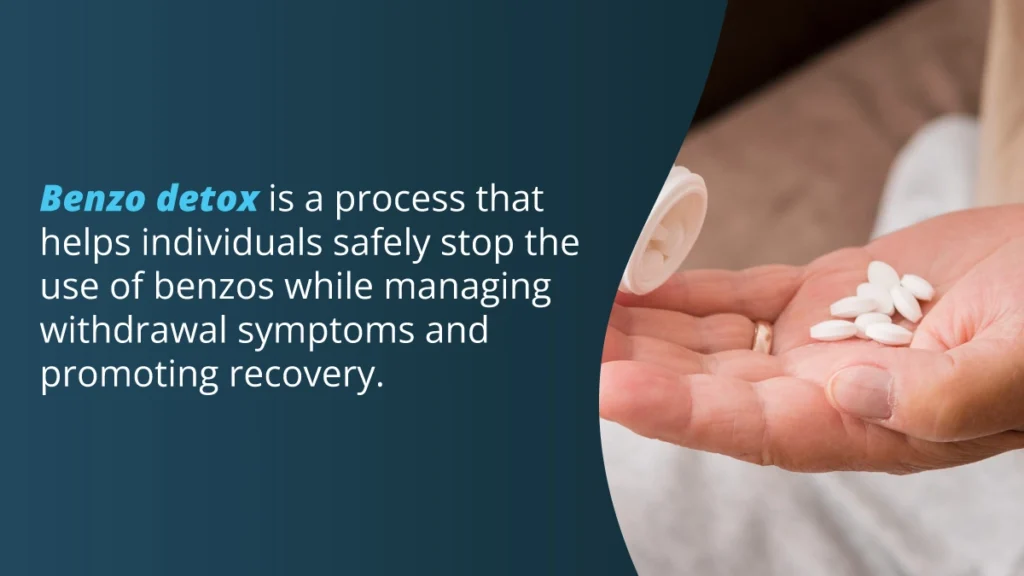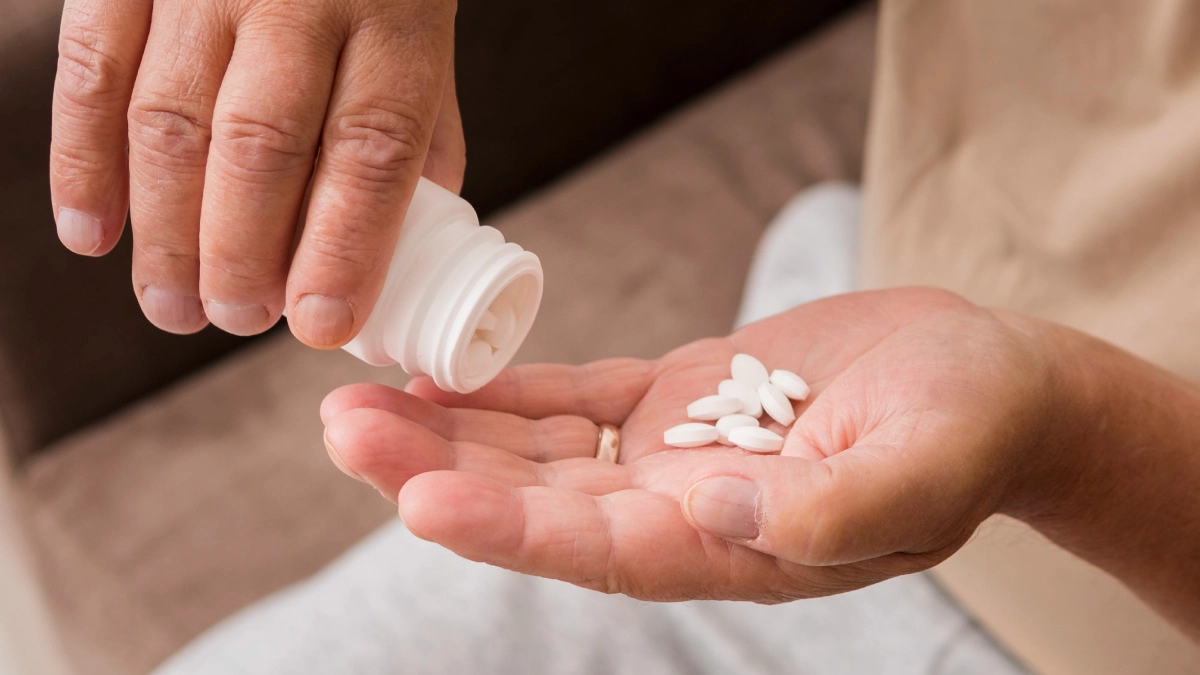Benzodiazepines, often called benzos, are prescription medications used to treat various conditions like anxiety, insomnia, and seizures. While they can be effective for short-term use, long-term use can lead to dependence, making it difficult to stop taking them.
This is where Benzo detox comes in. It involves safely removing the drug from the body while managing uncomfortable withdrawal symptoms. This journey can be challenging, but it is possible to regain control over your life with the right support and resources. Continue reading as we explore the benzo detox process in detail.
Key Takeaways
Understanding benzodiazepine detox is essential for those seeking to overcome dependence and regain control over their lives. Here is what this article covers:
- Symptoms of benzodiazepine withdrawal can be physical and psychological, varying in intensity for each individual.
- Effective management of symptoms involves medications, non-pharmacological support, and practical strategies.
- A comprehensive post-detox recovery plan, including long-term treatment and support networks, is vital for maintaining sobriety.
If you’re struggling with benzodiazepine addiction, The Haven Detox-New England offers hope and treatment services. Dial (844) 933-4145 for more details.

Introduction To Benzodiazepine Detox
Benzodiazepine detox, or benzo detox, is the process of stopping the use of benzodiazepines, which are medications often used to treat anxiety disorders, panic, and insomnia. Over time, regular use of these drugs can lead to physical dependence, meaning that the body starts to rely on them to function normally. When a person decides to stop taking benzos, they may face withdrawal symptoms, which can range from mild to severe.
The detox process focuses on safely managing these withdrawal symptoms as the body adjusts to being without the drug. This adjustment can involve changes in mood, sleep patterns, and physical sensations. Overall, benzo detox is an essential step toward regaining control over one’s health and life without the influence of these medications. It helps individuals move forward on their journey to recovery and well-being.
Benzo Detoxification Methods
Detoxifying from benzodiazepines can be done in several ways. Each method has its approach, and picking the right one depends on the individual’s needs.
Medical Detox
Medical detoxification is often the safest choice for those struggling with benzo addiction. This method can happen in an inpatient or outpatient setting. In a specialized drug detox facility, healthcare professionals supervise the process of managing withdrawal symptoms and carvings. They may provide medications to ease discomfort and ensure the individual stays safe throughout detox.
Natural Detox
Natural detox involves lifestyle changes and holistic approaches to support the body’s natural healing processes. This method often includes a balanced diet, exercise, hydration, and stress management techniques such as yoga and meditation. While natural detox may be appealing for its non-invasive nature, it’s essential to consult a healthcare professional to ensure safety and effectiveness.
Rapid Detox
Rapid detox aims to accelerate the withdrawal process through medical intervention. Patients are often placed under sedation while medications help cleanse the body of benzodiazepines. This method is controversial due to potential risks, including complications from sedation. A comprehensive assessment by a healthcare professional is necessary to determine if rapid detox is appropriate.
Common Benzodiazepine Withdrawal Symptoms
Benzodiazepine withdrawal can be a challenging process, as individuals may face a range of physical and psychological symptoms when they stop taking these prescription drugs.
Physical Symptoms
Benzodiazepine withdrawal can lead to various physical symptoms, which may include:
- Tremors: Uncontrollable shaking, often in the hands or body.
- Sweating: Increased perspiration, even in cool environments.
- Nausea: A feeling of sickness that may lead to vomiting.
- Muscle Pain: Discomfort or aching in various muscle groups.
- Headaches: Persistent pain in the head, which can vary in intensity.
- Dizziness: Feelings of lightheadedness or unsteadiness may arise.
- Seizures: Sudden, uncontrolled electrical disturbances in the brain.
- Heart Palpitations: Noticeable heartbeats or feeling like the heart is racing.
- Insomnia: Trouble falling or staying asleep, leading to fatigue.
- Sensitivity to Light and Sound: Increased discomfort or pain from bright lights or loud noises.
Psychological Symptoms
Withdrawal from benzodiazepines can also cause various psychological symptoms, including:
- Anxiety: Increased feelings of nervousness or worry.
- Depression: A low mood or feelings of sadness and hopelessness.
- Irritability: Increased frustration or annoyance with minor issues.
- Panic Attacks: Sudden episodes of intense fear or discomfort.
- Confusion: Difficulty concentrating or thinking clearly.
- Memory Problems: Trouble recalling information or forming new memories.
- Mood Swings: Rapid changes in emotional state, from highs to lows.
- Restlessness: Feelings of inner restlessness or agitation are common.
- Derealization: Feeling detached from reality or one’s surroundings.
- Hallucinations: Experiencing things that are not there, like seeing or hearing things
Withdrawal from different types of benzos can be uncomfortable and, in some cases, dangerous. It is vital for individuals experiencing these symptoms to seek professional help and support during this challenging time.
Managing Withdrawal Symptoms
Managing withdrawal symptoms during benzodiazepine detox is essential for a successful recovery. Several methods can help ease discomfort and promote healing.
Medications Used During Detox
Doctors often prescribe medications to help ease severe symptoms of withdrawal during detox. Common options include tapering doses of benzodiazepines to reduce the intensity of withdrawal. Additionally, medications like anti-anxiety drugs or antidepressants may be used to manage anxiety and mood swings. These medications can help stabilize the patient and make detox more bearable. It is vital to follow the doctor’s advice and not self-medicate.
Non-Pharmacological Support
Non-pharmacological support plays a crucial role in managing Benzo’s withdrawal symptoms. Therapy options, such as cognitive-behavioral therapy (CBT), can help individuals develop coping skills and address underlying issues related to their benzo use.
In addition, local support groups, such as 12-step programs, offer emotional guidance from others who have gone through similar experiences. Family support is also essential, as having loved ones involved can make the detox process less isolating and more manageable.
Strategies For Symptom Relief
Several practical strategies exist for relieving withdrawal symptoms. Mindfulness and relaxation techniques, such as deep breath exercises and meditation, can help reduce anxiety and promote calmness. Regular exercise can also improve mood and energy levels.
Eating a healthy detox diet, staying hydrated, and getting enough sleep are important for overall well-being. Engaging in hobbies and social activities can keep the mind busy and provide a sense of purpose during this transition.
Post-Detox Recovery
Completing detox is a significant step in overcoming benzodiazepine dependence, but recovery doesn’t stop there. A solid post-detox recovery plan is crucial for maintaining sobriety.
Aftercare Planning
Aftercare planning is a vital part of the addiction recovery process. It involves creating a structured plan that outlines the next steps after the Benzo detox program. This plan may include regular therapy sessions, participation in support groups, or follow-up appointments with healthcare providers.
A clear aftercare plan helps individuals stay accountable and motivated as they transition back to everyday life. Providing ongoing support and resources also lessens the risk of relapse.
Long-Term Addiction Treatment
Long-term addiction treatment is essential for maintaining sobriety after detox. Depending on the person’s needs, this treatment can occur in an inpatient or outpatient facility. Inpatient rehab provides a structured, supportive environment with 24/7 care, which can be helpful for those with severe substance use disorder (SUD).
Outpatient treatment allows patients to attend therapy at home, offering more flexibility. Both options provide tools and resources to help individuals address root issues of drug abuse and develop healthy coping skills.
Relapse Prevention
Relapse prevention is an essential part of post-detox recovery. Understanding triggers, situations, or feelings that lead to cravings is critical. Individuals can learn to identify and develop strategies to avoid or cope with these triggers.
Having a plan in place can help reduce the risk of relapse. This may include practicing stress-relief techniques, such as deep breathing exercises or physical activity, and having emergency contacts available for support during tough moments.
Building A Support Network
Building a support network is vital for long-term recovery. This network can include friends, family, and fellow recovery members. Having supportive people around can provide emotional encouragement during tough times.
Participating in local recovery groups, like Narcotics Anonymous (NA), can help individuals connect with others who understand their struggles. Engaging in community activities and social events can also strengthen these connections and reduce feelings of isolation.
Frequently Asked Questions (FAQ)
What is the most common withdrawal symptom with benzodiazepines?
The most common withdrawal symptom from benzodiazepines is anxiety. Individuals who have been taking these medications for a prolonged period may experience heightened anxiety levels when they stop or reduce their dosage. This anxiety can manifest as restlessness, irritability, and feelings of panic.
Other symptoms may include insomnia, muscle tension, and difficulty concentrating. Some people may also experience physical symptoms like sweating or increased heart rate. Because withdrawal can be uncomfortable, it’s essential for those who want to stop using benzos to seek medical guidance and support.
How to quit benzodiazepines?
Quitting benzodiazepines can be challenging but is possible with the right approach. Here are key steps to consider:
- Consult A Doctor: Always seek professional advice before changing your medication.
- Taper Gradually: Reduce your dosage slowly under medical supervision to minimize withdrawal symptoms.
- Seek Support: Join support groups and therapy sessions for guidance and encouragement.
- Healthy Habits: Focus on regular exercise, balanced nutrition, and good sleep to improve overall well-being.
- Stay Committed: Stay focused on your recovery goal, and be patient with yourself as you progress.
Taking these steps can lead to a safer and more successful transition.
How do you reverse benzodiazepine toxicity?
Reversing benzodiazepine toxicity primarily involves administering flumazenil, an antidote that can counteract the effects of benzodiazepines. This medication is typically given intravenously by medical professionals in a controlled setting. Flumazenil works by blocking benzodiazepine receptors in the brain, reversing sedation and respiratory depression.
However, it should be used cautiously, as it may lead to seizures, especially in individuals with a history of seizures or those who have taken other central nervous system depressants. Supporting measures, like monitoring vital signs and providing oxygen, are also essential. Always seek emergency medical help if benzodiazepine toxicity is suspected.
Discover A Path To Wellness At The Haven Detox-New England
If you’re feeling trapped by benzodiazepine dependence, it’s time to break free and embrace a brighter future. At The Haven Detox-New England, we’re here to guide you on this transformative journey.
Our medically supervised detox program will help your body safely eliminate the toxins of benzos, setting the stage for your next step. At our residential treatment program, you’ll experience a personalized blend of therapies, medications, and peer support designed just for you. You’ll also benefit from nutritional guidance that nourishes your body and mind.
If another mental health disorder accompanies your benzodiazepine abuse, our dual diagnosis program is here to help you regain balance. You deserve to thrive, and we’re dedicated to making that happen. Don’t let another moment pass you by. Take charge of your life today. Contact us at (844) 933-4145 and discover how our medical team can help you embrace a brighter future.
Verify Insurance
Let’s get you or a loved one help with a few simple steps.
-
Mental Illness Treatment




